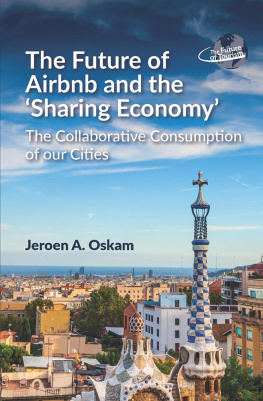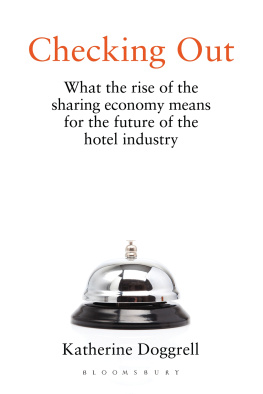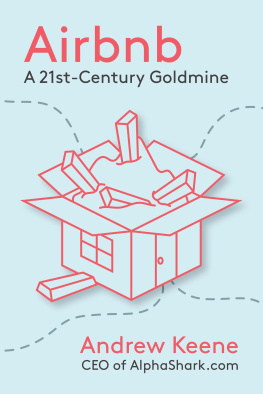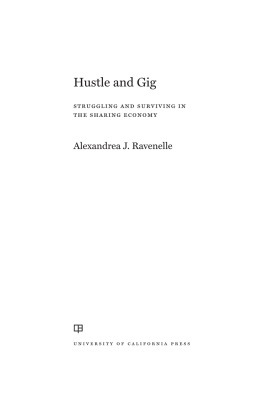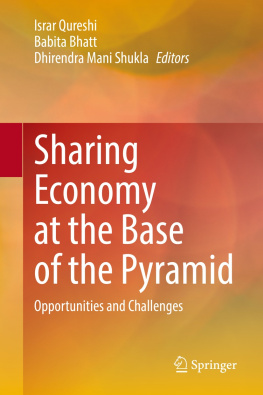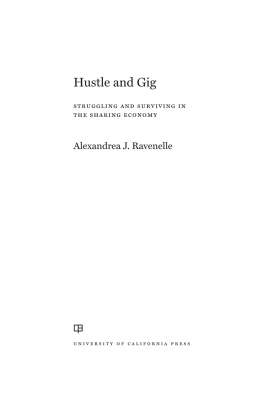The Future of Airbnb and the Sharing Economy
THE FUTURE OF TOURISM
Series Editors: Ian Yeoman, Victoria University of Wellington, New Zealand and Una McMahon-Beattie, Ulster University, Northern Ireland, UK
Some would say that the only certainties are birth and death; everything else that happens in between is uncertain. Uncertainty stems from risk, a lack of understanding or a lack of familiarity. Whether it is political instability, autonomous transport, hypersonic travel or peak oil, the future of tourism is full of uncertainty, but it can be explained or imagined through trend analysis, economic forecasting or scenario planning.
This new book series, The Future of Tourism, sets out to address the challenges and unexplained futures of tourism, events and hospitality. By addressing the big questions of change, examining new theories and frameworks or critical issues pertaining to research or industry, the series will stretch your understanding and generate dialogue about the future. By adopting a multidisciplinary perspective, be it through science fiction or computer-generated equilibrium modelling of tourism economies, the series will explain and structure the future to help researchers, managers and students understand how futures could occur. The series welcomes proposals on emerging trends and critical issues across the tourism industry and research. All proposals must emphasise the future and be embedded in research.
All books in this series are externally peer-reviewed.
Full details of all the books in this series and of all our other publications can be found on http://www.channelviewpublications.com, or by writing to Channel View Publications, St Nicholas House, 3134 High Street, Bristol BS1 2AW, UK.
THE FUTURE OF TOURISM: 1
The Future of Airbnb and the Sharing Economy
The Collaborative Consumption of our Cities
Jeroen A. Oskam
CHANNEL VIEW PUBLICATIONS
Bristol Blue Ridge Summit
DOI https://doi.org/10.21832/OSKAM6737
Library of Congress Cataloging in Publication Data
A catalog record for this book is available from the Library of Congress.
Names: Oskam, Jeroen A. author.
Title: The Future of Airbnb and the Sharing Economy: The Collaborative Consumption of our Cities/Jeroen A. Oskam.
Description: Bristol, UK; Blue Ridge Summit, PA: Channel View Publications, 2019. | Series: The Future of Tourism: 1 | Includes bibliographical references and index.
Identifiers: LCCN 2018051443 | ISBN 9781845416737 (hbk : alk. paper) | ISBN 9781845416720 (pbk : alk. paper) | ISBN 9781845416768 (kindle)
Subjects: LCSH: Peer-to-peer travelEconomic aspects. | Airbnb (Firm)
Classification: LCC G156.5.P44 O75 2019 | DDC 910.68dc23 LC record available at https://lccn.loc.gov/2018051443
British Library Cataloguing in Publication Data
A catalogue entry for this book is available from the British Library.
ISBN-13: 978-1-84541-673-7 (hbk)
ISBN-13: 978-1-84541-672-0 (pbk)
Channel View Publications
UK: St Nicholas House, 3134 High Street, Bristol, BS1 2AW, UK.
USA: NBN, Blue Ridge Summit, PA, USA.
Website: www.channelviewpublications.com
Twitter: Channel_View
Facebook: https://www.facebook.com/channelviewpublications
Blog: www.channelviewpublications.wordpress.com
Copyright 2019 Jeroen A. Oskam.
All rights reserved. No part of this work may be reproduced in any form or by any means without permission in writing from the publisher.
The policy of Multilingual Matters/Channel View Publications is to use papers that are natural, renewable and recyclable products, made from wood grown in sustainable forests. In the manufacturing process of our books, and to further support our policy, preference is given to printers that have FSC and PEFC Chain of Custody certification. The FSC and/or PEFC logos will appear on those books where full certification has been granted to the printer concerned.
Typeset by Nova Techset Private Limited, Bengaluru and Chennai, India.
Printed and bound in the UK by Short Run Press Ltd.
Printed and bound in the US by Thomson-Shore, Inc.
Contents
The interest in accommodation sharing and specifically Airbnb was born a few years ago, and first took shape with a scenario workgroup composed of practitioners and academics at the Amsterdam campus of Hotelschool The Hague in 2015. At that time, home sharing was still widely considered as a marginal curiosity in Amsterdam, and probably in many other places in Europe as well. This was initially also the predominant perspective in the scenario workgroup. Most participants wondered ingenuously about the appeal of sleeping in a strangers house in some neighbourhood, hotel companies were looking for ways to incorporate a similar kind of authenticity, while another concern was whether in the future it could become a competitive threat to hotel businesses.
A first reality check came when one of the participants a tourism researcher from a renowned national organisation asked if anyone knew how many visitors we had in Amsterdam because of Airbnb. Strange as it may sound, the phenomenon still seemed so limited at that time that nobody had given much thought to the volumes. This would be completely unthinkable nowadays, but the context was also different: in a continent just recovered from an economic and financial crisis, tourism growth was still welcomed as it generated jobs and spurred consumer confidence. At the same time, Amsterdam had proclaimed itself a sharing city, as an anti-consumerist and emancipatory answer to exactly the inefficacies and inequalities that had surfaced in the previous years.
Only when we started digging deeper, looking for numbers, did the stench of actual sharing practices and their externalities become stronger. We found that Airbnb did not facilitate any independent research. The only numbers available were data scraped from the website by activist researchers. Murray Cox and Tom Slee revealed the inequalities in the practices of Airbnb and the misrepresentations of their marketing narrative. Their studies opened our eyes to the commercial speculation to the detriment of neighbourhoods and residents that had emerged in what we stopped calling sharing. In the Sharing City of 2015, where progressive politicians in particular still identified with that narrative, this perspective was totally heretic. Our scenarios envisioned a commercialisation of the Airbnb offer in Amsterdam, which at that time sounded outrageous.
A partnership with the research department of Colliers International enabled us to purchase AirDNA data scrapes. The advantage of these data is that they are exhaustive. Whereas most scrapes are snapshots of the Airbnb offer at a specific moment, AirDNAs daily scrapes allowed for a more complete and detailed analysis, since the offer of urban vacation rentals is extremely volatile: listings are not always visible, but taken off and put back on the market. Also, AirDNA worked with a machine learning algorithm that gives insight into actual rental activity which since 2014 had been concealed in Airbnbs API: the data included a reservation status proxy which was extrapolated from the length of the new unavailable period, the time from the unavailable period from the last change, and the historical behaviour of the property. This implies a limitation, but still the AirDNA data constitute the most accurate approximation available of Airbnbs performance.
The Airbnb city reports that we subsequently started publishing with Colliers confirmed the profound changes in the market precisely in the course of this first scenario exercise. From 18,787 booked nights that were detected in January 2015, demand exploded to 107,418 nights one year later, a growth of 474%. This seemed extreme, but our outcomes could be triangulated with other data. With the 736,000 total booked nights, divided in a simple formula by the average length of stay (of 3.69 nights for Amsterdam during the entire year), and multiplied by an estimated party size (of between 2.52 and 3.00) per booking, we were able to calculate an approximate visitor number to Amsterdam of 555,000 for 2015. This outcome was corroborated by a survey-based study of NBTC Holland Marketing and by the tourist tax declaration of Airbnb to the city, which spoke of 575,000 visitors (Amsterdam Marketing, 2016; Bakker et al. , 2016a; Vranken & Van der Most, 2016). In 2016, we found 1.1 million visitors to Amsterdam, plus 88,000 for The Hague and 90,000 for Rotterdam, again in line with NBTC (Bakker et al. , 2017a, 2017b; NBTC Holland Marketing, 2017). Although Airbnb did not publish any numbers for that year and rejected our study, the numbers were also corroborated by a press release by the platform itself that spoke of 1.4 million visitors to the entire country (Sondermeijer, 2017). Our calculations for 2017 1.4 million visitors to Amsterdam could not yet be contrasted with any other numbers (Bakker et al. , 2018a).

